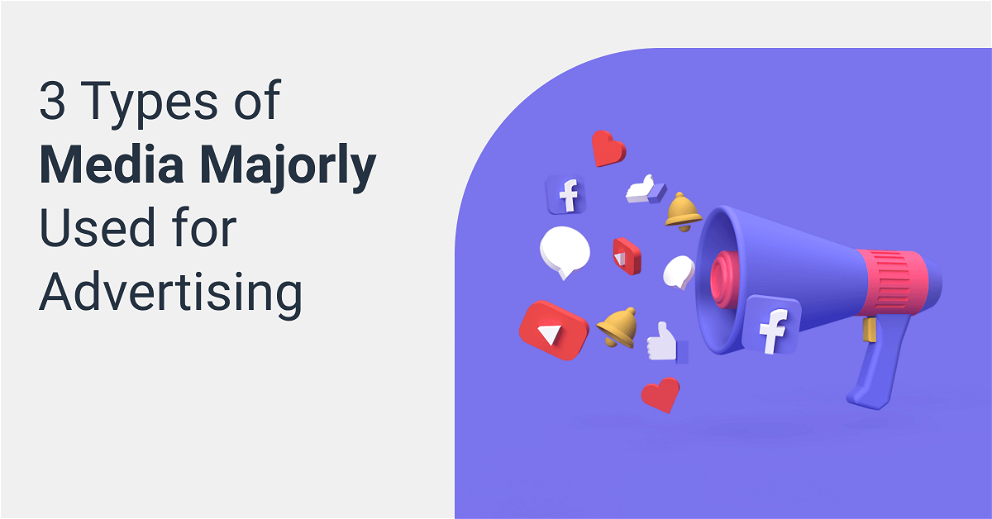What Are the Different Types of Media?
Media is the term we use to refer to different types of media that provide us with important information and knowledge. Media has always been part of our society, even when people used paintings and writings to share information.

Oct 23 2019●7 min read

As time passed, people came up with different modes to provide news to the public. Based on the type of medium, their role may be different, but they all exist to communicate to the audience and affect their perceptions. Today, we don’t have to travel oceans or wait for a pigeon to get the latest news.
Here, you’ll learn a lot about today’s media falling under three main categories.
Different Types of Media
The goal of media is to convey an advertising message to the audience through the most appropriate media channel for their product.
In general, you can classify media in three main categories.
Print Media
This type of news media used to be the only way of delivering information to the public. For the generations of the 80s and 90s, print media was the only media of entertain. People relied on newspapers and magazines to learn everything, from recipes and entertainment news to important information about the country or the world. Print media includes:
- Newspapers – printed and distributed on a daily or weekly basis. They include news related to sports, politics, technology, science, local news, national news, international news, birth notices, as well as entertainment news related to fashion, celebrities, and movies. Today’s parents grew up with this type of printed media.
- Magazines – printed on a weekly, monthly, quarterly, or annual basis. It contains information about finance, food, lifestyle, fashion, sports, etc.
- Books – focused on a particular topic or subject, giving the reader a chance to spread their knowledge about their favorite topic.
- Banners – used to advertise a company’s services and products, hung on easily-noticed sights to attract people’s attention.
- Billboards – huge advertisements created with the help of computers. Their goal is to attract people passing by.
- Brochures – a type of booklet that includes everything about one company – its products, services, terms and conditions, contact details, address, etc. These online brochures are either distributed with the newspapers or hand over to people.
- Flyers – used mostly by small companies due to the low cost of advertising. They contain the basic information about a company, their name, logo, service or product, and contact information, and they are distributed in public areas.
Broadcasting Media
Broadcasting media includes videos, audios, or written content that provides important or entertaining information shared by different methods:
- Television – in the past, there were a few channels sharing various types of content, whereas now we have hundreds of TV channels to choose from. Each channel delivers a different type of content, so you have a separate channel for news, drama, movies, sports, animation, nature, travel, politics, cartoon, and religion. It’s the number one broadcasting media due to its reach to the audience.
- Radio – uses radio waves to transmit entertaining, informative, and educative content to the public. Due to its high reach to the audience, radio is widely used for advertising products and services. Radio is one of the oldest means of entertainment, and today people often hear it to find out the weather and traffic while commuting.
- Movies – film, motion picture, screenplay, moving picture, or movie has world-wide reachability. It’s the best type of mass media to promote cultures and spread social awareness. Movies have always played a huge part in the entertainment world.
Internet Media
Nowadays, we are relying on the Internet to get the news a lot more often than traditional news sources. Websites provide information in the form of video, text, and audio. We can even choose the way we want to receive the news. Types of Internet media include:
- Social networks or websites – including Facebook, Instagram, Twitter, YouTube, Tumblr, LinkedIn, Snapchat, Quora, Reddit, Pinterest, etc. They are user-friendly and widely used by people around the world. Although we can find any news here, they may be misleading because of the lack of regulations on the content shared.
- Online forums - an online place where we can comment, message, or discuss a particular topic. Forums allow us to share knowledge with other people with the same interest. That’s why it’s regarded as the best platform to seek support and assistance.
- Podcast – a series of audios focused on a particular topic or theme. We can listen to them on a computer or a mobile phone. It’s a platform that allows anyone to share their knowledge and communicate with the world. You can browse some podcast hosting sites to see what fits your needs best.
- AI content – the rise of AI-generated content has disrupted the content creation and online media landscape. Plenty of blogs, videos, and more have been relying on different AI tools like ChatGPT, text to speech generators, AI report generators, content writers, and more.
Conclusion
We use different types of media to find out news, learn new things, and entertain ourselves. With the advance in technology, we can choose the type of media we want to use, no matter the time or place.
So, we can hear the radio while driving to work, we can watch our favorite show on our phone, and we can find out any information and news on our laptop or mobile device, thanks to the Internet. Who knows where technology can lead us in the future.

WRITTEN BY
Indrė Jankutė-CarmaciuIndrė is a copywriter at Whatagraph with extensive experience in search engine optimization and public relations. She holds a degree in International Relations, while her professional background includes different marketing and advertising niches. She manages to merge marketing strategy and public speaking while educating readers on how to automate their businesses.